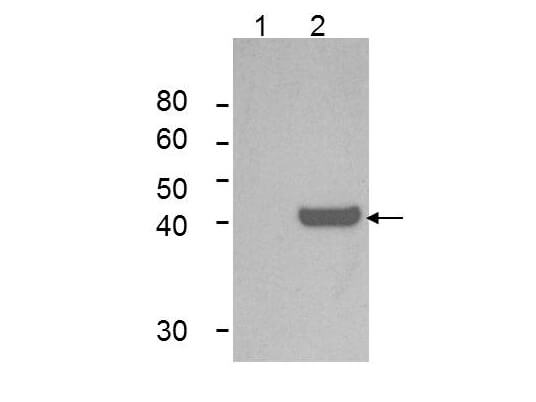Anti-IDO1 (MOUSE) Monoclonal Antibody
IDO1 Antibody
- SPECIFICATION
- CITATIONS
- PROTOCOLS
- BACKGROUND

| Host | Mouse |
|---|---|
| Conjugate | Unconjugated |
| Target Species | Human |
| Reactivity | Human, Mouse |
| Clonality | Monoclonal |
Application
| WB, IHC, E, IP, I, LCI |
| Application Note | Anti-IDO1 antibody has been tested in ELISA, IP, and Western Blot. This antibody is suitable for use in IHC and Flow Cytometry. Specific conditions for reactivity should be optimized by the end user. |
| Physical State | Liquid (sterile filtered) |
| Buffer | 0.02 M Potassium Phosphate, 0.15 M Sodium Chloride, pH 7.2 |
| Immunogen | Anti-IDO1 (MOUSE) Monoclonal Antibody was produced in mouse by repeated immunizations with fragment of recombinant human and mouse IDO1 protein followed by hybridoma development. |
| Preservative | 0.01% (w/v) Sodium Azide |
| Gene ID | 3620 |
|---|---|
| Other Names | 3620 |
| Purity | Anti-IDO1 was purified from concentrated tissue culture supernate by Protein G chromatography followed by extensive dialysis against the buffer stated above. This antibody is specific for human and mouse IDO1 protein. A BLAST analysis was used to suggest cross-reactivity with IDO1 from human and mouse sources based on 100% homology with the immunizing sequence. Cross-reactivity with IDO1 from other sources has not been determined. |
| Storage Condition | Store vial at -20° C prior to opening. Aliquot contents and freeze at -20° C or below for extended storage. Avoid cycles of freezing and thawing. Centrifuge product if not completely clear after standing at room temperature. This product is stable for several weeks at 4° C as an undiluted liquid. Dilute only prior to immediate use. |
| Precautions Note | This product is for research use only and is not intended for therapeutic or diagnostic applications. |
| Name | IDO1 (HGNC:6059) |
|---|---|
| Synonyms | IDO, INDO |
| Function | Catalyzes the first and rate limiting step of the catabolism of the essential amino acid tryptophan along the kynurenine pathway (PubMed:17671174). Involved in the peripheral immune tolerance, contributing to maintain homeostasis by preventing autoimmunity or immunopathology that would result from uncontrolled and overreacting immune responses (PubMed:25691885). Tryptophan shortage inhibits T lymphocytes division and accumulation of tryptophan catabolites induces T-cell apoptosis and differentiation of regulatory T-cells (PubMed:25691885). Acts as a suppressor of anti-tumor immunity (PubMed:14502282, PubMed:23103127, PubMed:25157255, PubMed:25691885). Limits the growth of intracellular pathogens by depriving tryptophan (PubMed:25691885). Protects the fetus from maternal immune rejection (PubMed:25691885). |
| Cellular Location | Cytoplasm, cytosol {ECO:0000250|UniProtKB:P28776, ECO:0000303|PubMed:25691885} |
| Tissue Location | Expressed in mature dendritic cells located in lymphoid organs (including lymph nodes, spleen, tonsils, Peyers's patches, the gut lamina propria, and the thymic medulla), in some epithelial cells of the female genital tract, as well as in endothelial cells of term placenta and in lung parenchyma (PubMed:25691885). Weakly or not expressed in most normal tissues, but mostly inducible in most tissues (PubMed:25691885). Expressed in more than 50% of tumors, either by tumoral, stromal, or endothelial cells (expression in tumor is associated with a worse clinical outcome) (PubMed:18418598). Not overexpressed in tumor-draining lymph nodes (PubMed:25691885, PubMed:26155395). |

Thousands of laboratories across the world have published research that depended on the performance of antibodies from Abcepta to advance their research. Check out links to articles that cite our products in major peer-reviewed journals, organized by research category.
info@abcepta.com, and receive a free "I Love Antibodies" mug.
Provided below are standard protocols that you may find useful for product applications.
Background
Indoleamine 2, 3-dioxygenase1 (IDO1) is a 41-42 kD intracellular enzyme that catabolizes tryptophan into kynurenine. IDO1 modulates levels of the amino acid tryptophan, which is vital for cell growth, but is also involved in the suppression of the immune response. IDO1 effects on immune suppression are due to decreased tryptophan availability and the generation of tryptophan metabolites, resulting in negative effects on T lymphocytes, including proliferation, function and survival. IDO1 may be involved in the suppression of the immune response to tumors, and blocking the IDO1 pathway may be a potential target for immuno and cancer therapy. IDO1 is expressed in a wide variety of tissues and can be upregulated by interferon gamma and other inflammatory cytokines.
If you have used an Abcepta product and would like to share how it has performed, please click on the "Submit Review" button and provide the requested information. Our staff will examine and post your review and contact you if needed.
If you have any additional inquiries please email technical services at tech@abcepta.com.













 Foundational characteristics of cancer include proliferation, angiogenesis, migration, evasion of apoptosis, and cellular immortality. Find key markers for these cellular processes and antibodies to detect them.
Foundational characteristics of cancer include proliferation, angiogenesis, migration, evasion of apoptosis, and cellular immortality. Find key markers for these cellular processes and antibodies to detect them. The SUMOplot™ Analysis Program predicts and scores sumoylation sites in your protein. SUMOylation is a post-translational modification involved in various cellular processes, such as nuclear-cytosolic transport, transcriptional regulation, apoptosis, protein stability, response to stress, and progression through the cell cycle.
The SUMOplot™ Analysis Program predicts and scores sumoylation sites in your protein. SUMOylation is a post-translational modification involved in various cellular processes, such as nuclear-cytosolic transport, transcriptional regulation, apoptosis, protein stability, response to stress, and progression through the cell cycle. The Autophagy Receptor Motif Plotter predicts and scores autophagy receptor binding sites in your protein. Identifying proteins connected to this pathway is critical to understanding the role of autophagy in physiological as well as pathological processes such as development, differentiation, neurodegenerative diseases, stress, infection, and cancer.
The Autophagy Receptor Motif Plotter predicts and scores autophagy receptor binding sites in your protein. Identifying proteins connected to this pathway is critical to understanding the role of autophagy in physiological as well as pathological processes such as development, differentiation, neurodegenerative diseases, stress, infection, and cancer.


